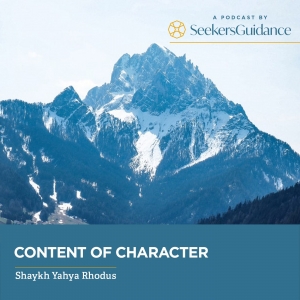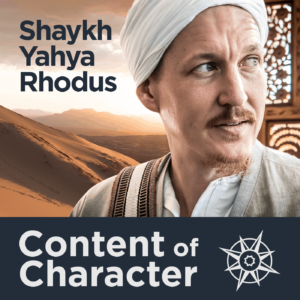
Content of Character with Shaykh Yahya Rhodus
SeekersGuidance.org
SeekersGuidance Podcast - Islam, Islamic Knowledge, Quran, and the guidance of the Prophet Muhammad
- 14 minutes 11 secondsSeeking Protection with His Name- Shaykh Yahya Rhodus
In response to the fear and concern brought about by the recent spread of the Covid-19 virus, Shaykh Yahya Rhodus reminds us of the importance of seeking protection with Allah’s Name. In this important and timely reminder, Shaykh Yahya comments on the following prophetic duʿa (supplication) and encourages everyone to recite it daily:
بِسْمِ اللهِ الَّذِي لَا يَضُرُّ مَعَ اسْمِهِ شَيْءٌ فِي الْأَرْضِ وَلَا فِي السَّمَاءِ وَهُوَ السَّمِيعُ الْعَلِيمُ
“In the name of Allah, with Whose name nothing on earth or in heaven can harm—He is the All-Hearing and All-Knowing.”
For more information on Al-Maqasid’s programs, please visit www.almaqasid.org
The post Seeking Protection with His Name- Shaykh Yahya Rhodus appeared first on SeekersGuidance.
24 March 2020, 12:00 am - 11 minutes 3 seconds72- Concern for Neighbors- Shaykh Yahya Rhodus
In this episode, Shaykh Yahya Rhodus explains the prophetic hadith: “A believer is not one who eats his fill while his next-door neighbor goes hungry.” (Bukhari; Adab al-Mufrad). Shaykh Yahya goes on to remind the believers of the importance of one’s neighbors and the prophetic counsel and concern towards one’s neighbors. Some of the rights toward one’s neighbors being: 1) Bearing any harm from them, 2) While doing good things to them, and 3) Showing excellence toward them when possible.
The Content of Character is a remarkable collection of sayings of the Prophet Muhammad. Chosen by the scholar, Shaykh Al-Amin Ali Mazrui and translated by Shaykh Hamza Yusuf, this book was published to great critical acclaim.
Shaykh Al-Amin intended to show that progress among Muslims required not the abandonment of Islam but the recovery of the original spirit of Islamic enlightenment.
In this podcast series for SeekersHub, Shaykh Yahya Rhodus does a commentary on these concise and yet comprehensive sayings, with a special focus on character-building, morals, good manners and ethics.
Check out all of the SeekersGuidance podcasts by visiting https://seekersguidance.org/podcasts/
The post 72- Concern for Neighbors- Shaykh Yahya Rhodus appeared first on SeekersGuidance.
20 March 2019, 11:42 pm - 9 minutes 59 seconds71- Gender Consideration

In this episode, Shaykh Yahya Rhodus expounds on the prophetic hadith: “God condemns a man who dresses like a woman or a woman who dresses like a man.” (Al-Hakim) The distinction between genders – complementary pairs – is one of the signs of Allah, the truly and only One. To blur or erase this distinction is to cover up the signs, and to destroy the fitra. To preserve the distinction is part and parcel of preserving the truth of religion.
The Content of Character is a remarkable collection of sayings of the Prophet Muhammad. Chosen by the scholar, Shaykh Al-Amin Ali Mazrui and translated by Shaykh Hamza Yusuf, this book was published to great critical acclaim.
Shaykh Al-Amin intended to show that progress among Muslims required not the abandonment of Islam but the recovery of the original spirit of Islamic enlightenment.
In this podcast series for SeekersHub, Shaykh Yahya Rhodus does a commentary on these concise and yet comprehensive sayings, with a special focus on character-building, morals, good manners and ethics.
Check out all of the SeekersGuidance podcasts by visiting https://seekersguidance.org/podcasts/
The post 71- Gender Consideration appeared first on SeekersGuidance.
10 February 2019, 3:48 pm - 11 minutes70 – The Danger of Usury

In this episode Shaykh Yahya Rhodus warns of the prohibition of usury (riba). Allah condemns, and literally curses, the one who pays, witnesses, or notarizes usury. This Hadith can be found in Imam Ahmad and Abu Dawud. This is an example of a prophetic prohibition. There are two types of people Allah has waged war on, as mentioned in the Hadith. 1) His close friends, 2) The one engaged in usury. There is an intense warning of usury . If Allah wages war against one the person will be ruined, and nothing is left for them of this life, even if one is outwardly living. There would be no quality of life in this world, let alone when that person returs to Allah. The one who writes it down is also liable, because he is content for it to happen. Imam Nawawi points out that one who assists is also wrong. Shaykh Yahya then explains that two types of usury that the scholars of fiqh point out. He then goes on to explain the analogy Imam Ghazali mentions, that money is not meant to create more money. Shaykh Yahya ends by warning of the many dangers of interest, and explaining what is meant by the dust of interest.
The Content of Character is a remarkable collection of sayings of the Prophet Muhammad. Chosen by the scholar, Shaykh Al-Amin Ali Mazrui and translated by Shaykh Hamza Yusuf, this book was published to great critical acclaim.
Shaykh Al-Amin intended to show that progress among Muslims required not the abandonment of Islam but the recovery of the original spirit of Islamic enlightenment.
In this podcast series for SeekersHub, Shaykh Yahya Rhodus does a commentary on these concise and yet comprehensive sayings, with a special focus on character-building, morals, good manners and ethics.
Check out all of the SeekersGuidance podcasts by visiting https://seekersguidance.org/podcasts/
The post 70 – The Danger of Usury appeared first on SeekersGuidance.
25 December 2018, 5:24 am - 9 minutes 17 seconds69 – Etiquette with Graves

In this episode Shaykh Yahya Rhodus highlights some of the etiquettes regarding graves. He quotes Prophet Muhammad (peace and blessings be upon him) as saying: “Allah censures women who frequent graves, as well as those who take them as prayer sites or places where they place lamps.” In order to understand this narration, Shaykh Yahya starts by explaining what life and death mean for Muslims. Death is the departure of the soul from the body. The purpose of life is to prepare to meet God. In that sense, for a believer, death is a gift because they should long for meeting their beloved, Allah Most High. So death is the moving on of the soul into the next realm, the intermediary realm. This context helps one understand how to have etiquette with the deceased who have moved on to the next realm. In this light, Shaykh Yahya explains, the scholars understand this narration to forbid wrong practices around the grave, rather than forbid women to visit graves altogether. There are various other narrations that display the permissibility of women visiting the graves. Wrong and excessive practices include whaling, tearing clothes, and such other acts. Regarding taking graves as prayer sights, the scholars understood this to mean to not build places of prayer on top of graves. However, it is permissible to have places of prayer next to the graves. Finally, the meaning of censuring placing lamps at graves specifically relates to when those lamps are for the purpose of calling people to those graves. However, if lamps where placed for the benefit of people, then it is permissible. Ultimately, one of the greatest etiquettes when visiting graves is to be reminded of the next world and prepare for meeting our Lord.
The Content of Character is a remarkable collection of sayings of the Prophet Muhammad. Chosen by the scholar, Shaykh Al-Amin Ali Mazrui and translated by Shaykh Hamza Yusuf, this book was published to great critical acclaim.
Shaykh Al-Amin intended to show that progress among Muslims required not the abandonment of Islam but the recovery of the original spirit of Islamic enlightenment.
In this podcast series for SeekersHub, Shaykh Yahya Rhodus does a commentary on these concise and yet comprehensive sayings, with a special focus on character-building, morals, good manners and ethics.
Check out all of the SeekersGuidance podcasts by visiting https://seekersguidance.org/podcasts/
The post 69 – Etiquette with Graves appeared first on SeekersGuidance.
5 December 2018, 6:39 am - 7 minutes 28 seconds68 – Repeating What We Hear

In this episode Shaykh Yahya Rhodus highlights how repeating everything that one hears is a blameworthy trait. He quotes Prophet Muhammad (peace and blessings be upon him) as saying: “It is sufficient for a man to be considered to have sinned if he [simply] repeats everything he hears.” Shaykh Yahya explains that what this narration tells us, is the importance of verifying and ascertaining the truth from falsehood of what we hear from people. This is especially emphasized when it relates to hearing things regarding other people. If one simply repeats everything they hear, they will inevitably mix falsehood with truth in what they say. Saying falsehood is lying, which is sinful. This teaches us to have intellectual, religious, and spiritual maturity so we can learn to decipher what is true and what is not true. This is part of taqwa and preserving honor.
The Content of Character is a remarkable collection of sayings of the Prophet Muhammad. Chosen by the scholar, Shaykh Al-Amin Ali Mazrui and translated by Shaykh Hamza Yusuf, this book was published to great critical acclaim.
Shaykh Al-Amin intended to show that progress among Muslims required not the abandonment of Islam but the recovery of the original spirit of Islamic enlightenment.
In this podcast series for SeekersHub, Shaykh Yahya Rhodus does a commentary on these concise and yet comprehensive sayings, with a special focus on character-building, morals, good manners and ethics.
Check out all of the SeekersGuidance podcasts by visiting https://seekersguidance.org/podcasts/
The post 68 – Repeating What We Hear appeared first on SeekersGuidance.
1 November 2018, 4:12 am - 6 minutes 15 seconds67 – Kind Words Are Charity

In this episode Shaykh Yahya Rhodus highlights how a kind word is charity. He quotes Prophet Muhammad (peace and blessings be upon him) as saying: “A kind word is charity.” Shaykh Yahya begins by explaining that Prophet Muhammad (peace and blessings be upon him) is expanding our understanding of charity, and not limiting it to just the giving of wealth. Any good deed is a charity. In that light, any word of kindness is a charity. So any time we rectify between people, or clarify something for people, or anything that allows someone to respond to a situation in a religious way, all of those are charities. Shaykh Yahya then concludes by verses 24 and 25 of Surat Ibrahim: “Do you not see how Allah compares a good word to a good tree? Its root is firm and its branches reach the sky, always yielding its fruit in every season by the Will of its Lord. This is how Allah sets forth parables for the people, so perhaps they will be mindful.”
The Content of Character is a remarkable collection of sayings of the Prophet Muhammad. Chosen by the scholar, Shaykh Al-Amin Ali Mazrui and translated by Shaykh Hamza Yusuf, this book was published to great critical acclaim.
Shaykh Al-Amin intended to show that progress among Muslims required not the abandonment of Islam but the recovery of the original spirit of Islamic enlightenment.
In this podcast series for SeekersHub, Shaykh Yahya Rhodus does a commentary on these concise and yet comprehensive sayings, with a special focus on character-building, morals, good manners and ethics.
Check out all of the SeekersGuidance podcasts by visiting https://seekersguidance.org/podcasts/
The post 67 – Kind Words Are Charity appeared first on SeekersGuidance.
25 October 2018, 4:40 am - 11 minutes 42 seconds66 – Contentment

In this episode Shaykh Yahya Rhodus highlights the character trait of contentment. He quotes Prophet Muhammad (peace and blessings be upon him) as saying: “You must embody contentment, for it is wealth that does not deplete.” Shaykh Yahya begins by explaining the linguistic meaning of qana’a (contentment), which the Arabic word used in the related narration. He explains that it means to be content with the apportioned provision, or with that which is enough to get by with. This word is also related to the word qinaa’, which means a face cover. Shaykh Yahya points out that contentment, in that sense, veils poverty. He also provides more definitions of contentment that scholars have mentioned, that bring out some meanings of the nature of the character trait. Shaykh Yahya highlight that one of the abandoned sunnas, is to be content with a small amount of wealth or provision. By having contentment, one finds wealth in the small amount that they have, and inwardly they are in a state of stillness. Finally Shaykh Yahya relates some narrations from Prophet Muhammad (peace and blessings be upon him) that highlight the virtue of contentment and its ultimate benefit in the hereafter.
The Content of Character is a remarkable collection of sayings of the Prophet Muhammad. Chosen by the scholar, Shaykh Al-Amin Ali Mazrui and translated by Shaykh Hamza Yusuf, this book was published to great critical acclaim.
Shaykh Al-Amin intended to show that progress among Muslims required not the abandonment of Islam but the recovery of the original spirit of Islamic enlightenment.
In this podcast series for SeekersHub, Shaykh Yahya Rhodus does a commentary on these concise and yet comprehensive sayings, with a special focus on character-building, morals, good manners and ethics.
Check out all of the SeekersGuidance podcasts by visiting https://seekersguidance.org/podcasts/
The post 66 – Contentment appeared first on SeekersGuidance.
3 October 2018, 3:34 am - 8 minutes 2 seconds65 – The Scholar’s Preeminence

In this episode Shaykh Yahya Rhodus highlights the preeminence of scholars in Islam. He quotes Prophet Muhammad (peace and blessings be upon him) as saying: “One beneficial scholar is better than a thousand worshipful devotees.” Shaykh Yahya begins by explaining that the beneficial scholar referred to in the narration is primarily one who has knowledge of the religion (shari’a). The knowledge of the scholar benefits many people by guiding them, as opposed to the worship of the devotee which only benefits himself. Shaykh Yahya emphasizes that our religion is a religion of knowledge, and one should seek to increase in knowledge everyday of their life. He also provides the overarching principle of what shari’a is about. It is about acquiring benefit and warding off harm, in this life and the next. So in that sense, knowledge of the religion is like an army that helps one overcome their lower self and the devil, and their army of desires. This knowledge helps us learn about the subtle faults of our own soul, the destructive vices, the nullifiers of our actions, the true nature of this world, the true bliss of the next world and how our hearts should be. This is the true meaning and reality of the knowledge of religion (fiqh).
The Content of Character is a remarkable collection of sayings of the Prophet Muhammad. Chosen by the scholar, Shaykh Al-Amin Ali Mazrui and translated by Shaykh Hamza Yusuf, this book was published to great critical acclaim.
Shaykh Al-Amin intended to show that progress among Muslims required not the abandonment of Islam but the recovery of the original spirit of Islamic enlightenment.
In this podcast series for SeekersHub, Shaykh Yahya Rhodus does a commentary on these concise and yet comprehensive sayings, with a special focus on character-building, morals, good manners and ethics.
Check out all of the SeekersGuidance podcasts by visiting https://seekersguidance.org/podcasts/
The post 65 – The Scholar’s Preeminence appeared first on SeekersGuidance.
31 July 2018, 3:56 pm - 8 minutes 44 seconds64 – Fasting and Health

In this episode Shaykh Yahya Rhodus highlights some of the benefits for fasting. He quotes Prophet Muhammad (peace and blessings be upon him) as saying: “Fast and be healthy.” Shaykh Yahya begins by remarking that Prophet Muhammad (peace and blessings be upon him) pointed us to all good and all that is of benefit. Being healthy is one of the many benefits of fasting. There is much that is being discovered by modern science about the many health benefits of fasting. Shaykh Yahya then makes an important note, that we should not relegate and limit the wisdom of the great worship of fasting to just health benefits. Regarding how we view fasting and Ramadan, Shaykh Yahya cites and recommends reading an article titled, “Ramadan: The Month of Anti-Imperialism”, by Mariem Masmoudi (https://traversingtradition.com/2018/06/04/ramadan-month-of-anti-imperialism/). He also extends the meaning of health, to intellectual health and spiritual, and not just physical health. Finally, he concludes that this a means empower the spirit over lowly desires.
The Content of Character is a remarkable collection of sayings of the Prophet Muhammad. Chosen by the scholar, Shaykh Al-Amin Ali Mazrui and translated by Shaykh Hamza Yusuf, this book was published to great critical acclaim.
Shaykh Al-Amin intended to show that progress among Muslims required not the abandonment of Islam but the recovery of the original spirit of Islamic enlightenment.
In this podcast series for SeekersHub, Shaykh Yahya Rhodus does a commentary on these concise and yet comprehensive sayings, with a special focus on character-building, morals, good manners and ethics.
Checkout all of the SeekersHub podcasts by visiting http://seekershub.org/podcasts/
The post 64 – Fasting and Health appeared first on SeekersGuidance.
24 July 2018, 7:50 pm - More Episodes? Get the App
Your feedback is valuable to us. Should you encounter any bugs, glitches, lack of functionality or other problems, please email us on [email protected] or join Moon.FM Telegram Group where you can talk directly to the dev team who are happy to answer any queries.


 Mohamed Ghilan
Mohamed Ghilan
 Al-Maqasid
Al-Maqasid